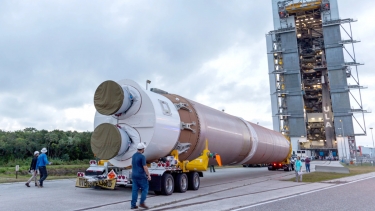Project Kuiper vice president of technology Rajeev Badyal in a statement expressed confidence about satellite design but pointed out, "there's no substitute for on-orbit testing."
“This is Amazon’s first time putting satellites into space, and we’re going to learn an incredible amount regardless of how the mission unfolds," he said.
US media CNBC reported Amazon wants to plan a built of network of 3,236 satellites, investing US$10 billion to build Kuiper, and broke ground on a US$120 million pre-launch processing facility in Florida.
|
|
The flight last Friday was named "Protoflight" with United Launch Alliance's Atlas V rocket carrying two satellites: Kuipersat-1 and Kuipersat-2.
According to US media, Amazon twice switched rides before onboarding the Atlas V rocket. It was intended to originally launch on ABL Space's RS1 rocket but was delayed, prompting it to tranfer to the United Launch Alliance Vulcan Rocket.
It was delayed again and the satellites were moved to Atlas V.
Amazon did not provide information about the size and design of the satellites and only shared photos of the shipping containers that delivered the spacecraft to Florida.
ULA's details about the launch were also limited.
Amazon last year signed what it claimed to be "the biggest corporate rocket deal" in the history to launch the Kuiper satellites, inking contracts with ULA, Arianespace, and Jeff Bezos' Blue Origin worth a total of US$7.4 billion.
However, the contracts have met a shareholder lawsuit that accuses Amazon of "failing to do proper due diligence" and failing to consider potentially cheaper rockets from its rival SpaceX.
According to US media, the contracts have booked 77 launches, fast enough to outpace regulatory requirements.
Last week, Amazon said its first production of Kuiper satellites are on track to launch in the first half of next year. It is planning to begin beta testing with customers by the end of 2024.










































